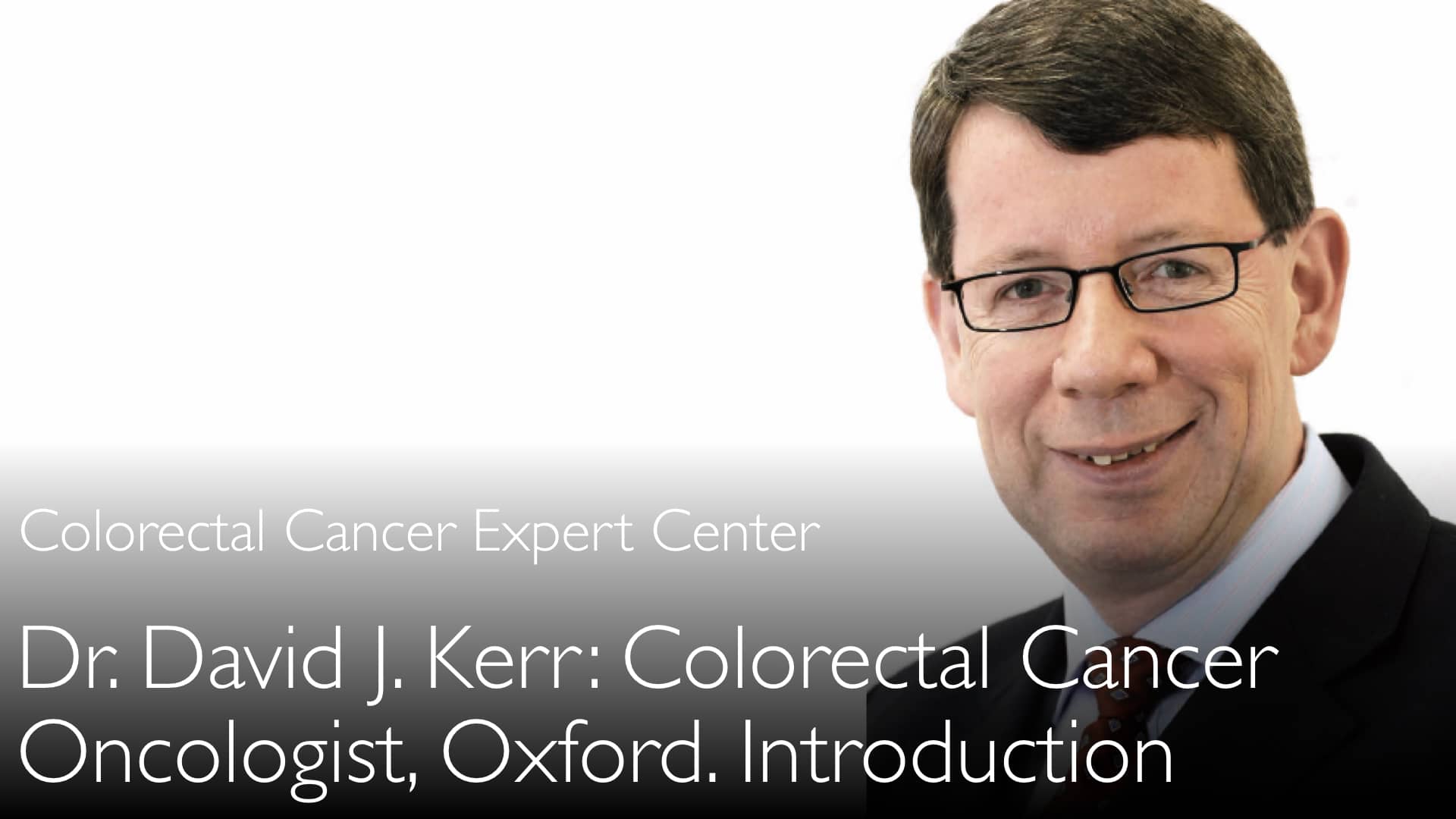Suolistosyövän johtava asiantuntija, lääketieteen tohtori David Kerr, korostaa moniammatillisen tiimin (MDT) merkittävää roolia hoidon kehityksessä. MDT parantaa diagnostiikkaa, kirurgista laatua ja tarkkojen lääkehoitojen valintaa, myös levinneessä vaiheen 4 taudissa, jossa on etäpesäkkeitä.
Nykyaikainen paksu- ja peräsuolisyövän hoito: Moniammatillisen tiimin voima
Hyppää osioon
- Moniammatillisen tiimin (MDT) lähestymistapa
- Kirurgisen laadun parantaminen
- Edistys patologisessa raportoinnissa
- Uudet lääke- ja kemoterapiavaihtoehdot
- Tarkkamediisina ja kohdennettu hoito
- Toisen lausunnon kriittinen rooli
- Edenneen ja metastasoituneen paksu- ja peräsuolisyövän hoito
Moniammatillisen tiimin (MDT) lähestymistapa
Moniammatillinen tiimityö on tärkein edistysaskel nykyaikaisessa paksu- ja peräsuolisyövän hoidossa. Lääketieteen tohtori David Kerrin mukaan erikoislääkärit kuten kirurgit, onkologit ja sädehoidon asiantuntijat työskentelivät aiemmin erillään. Nykyään tiiviisti integroitu moniammatillinen yhteistyö takaa paremman päätöksenteon jokaiselle potilaalle. Asiantuntijatiimi määrittää yhdessä tarkan diagnoosin ja laatii potilaskohtaisen, kattavan hoitosuunnitelman alusta alkaen.
Kirurgisen laadun parantaminen
Kehittyneet kirurgiset tekniikat, erityisesti peräsuolisyövän kohdalla, hyödyntävät suoraan moniammatillista tiimityötä. Lääketieteen tohtori David Kerrin mukaan paksu- ja peräsuolisyövän kirurgian laatu on parantunut merkittävästi. Nämä edistykset vaikuttavat ratkaisevasti potilaiden hoitotuloksiin ja muodostavat kulmakiven moniammatillisen tiimin kehittämälle henkilökohtaiselle hoitostrategialle.
Edistys patologisessa raportoinnissa
Tarkka patologia on tehokkaan syöpähoidon perusta. Patologisten raporttien laatu on parantunut dramaattisesti, mikä tarjoaa moniammatilliselle tiimille kriittistä tietoa optimaalisten hoitopäätösten tekemiseksi. Kuten lääketieteen tohtori David Kerr selittää, tämä yksityiskohtainen diagnostinen tieto on välttämätöntä potilaskohtaisen ja tehokkaan hoitostrategian muotoilemiseksi.
Uudet lääke- ja kemoterapiavaihtoehdot
Lääkeonkologia on tuonut tehokkaita uusia lääkkeitä paksu- ja peräsuolisyövän hoitoon. Lääketieteen tohtori David Kerr vahvistaa, että nämä uudet kemoterapiamuodot ovat tehokkaampia paksusuolisyöpää vastaan. Moniammatillinen tiimi arvioi ja valitsee nämä hoitovaihtoehdot, varmistaen kemoterapian täydellisen sovittamisen potilaan omaan syöpäprofiiliin.
Tarkkamediisina ja kohdennettu hoito
Tarkkamediisina mullistaa paksu- ja peräsuolisyövän hoitoa. Molekyylidiagnostiikan avulla moniammatillinen tiimi pystyy ymmärtämään potilaan kasvaimen geneettiset mekanismit. Tämä tieto mahdollistaa kohdennettujen hoitojen valinnan ja siirtymisen yleispätevästä lähestymistavasta aidosti henkilökohtaiseen hoitosuunnitelmaan, joka tarjoaa parhaat mahdolliset tulokset.
Toisen lausunnon kriittinen rooli
Toisen lausunnon hakeminen kansainväliseltä moniammatilliselta tiimiltä on potilaille ratkaiseva askel. Lääketieteen tohtorit Anton Titov ja David Kerr korostavat, että tämä prosessi vahvistaa alkuperäisen diagnoosin oikeellisuuden ja täydellisyyden. Toinen lausunto antaa varmuuden siitä, että ehdotettu hoito on todella paras saatavilla oleva, ja voi jopa vahvistaa parantumisen mahdollisuuden myös edenneissä tapauksissa.
Edenneen ja metastasoituneen paksu- ja peräsuolisyövän hoito
Potilailla, joilla on vaihe 4:n paksu- ja peräsuolisyöpä ja esimerkiksi maksaan tai keuhkoihin levinneitä metastaseja, moniammatillinen tiimilähestymistapa on korvaamaton. Lääketieteen tohtori David Kerr korostaa, että tiimi valitsee huolellisesti parhaat hoitovaihtoehdot, jotka usein yhdistävät kirurgiaa, kohdennettua kemoterapiaa ja muita menetelmiä. Tämä kattava strategia pyrkii hallitsemaan tautia tehokkaasti ja mahdollisesti saavuttamaan parannuksen.
Koko tekstitys
Johtava paksu- ja peräsuolisyövän asiantuntija Oxfordista keskustelee viimeaikaisista edistyksistä paksusuolisyövän hoidossa. Moniammatillisen tiimin (MDT) lähestymistapa paksu- ja peräsuolisyöpäpotilaiden arviointiin on tärkein edistysaskel paksusuolisyövän hoidossa.
Lääketieteen tohtori Anton Titov: Hei! Tänään olemme lääketieteen tohtori David Kerrin kanssa, joka on syöpälääketieteen professori Oxfordin yliopistossa. Tohtori Kerr on myös Euroopan lääketieteellisen onkologian seuran entinen puheenjohtaja. Tohtori Kerr suoritti lääketieteen tohtorin tutkinnon Glasgow'n yliopistossa.
Tohtori Kerr suoritti jatkokoulutuksensa kliinisessä onkologiassa ja syöpätutkimuksessa useissa johtavissa brittiläisissä ja yhdysvaltalaisissa instituutioissa. Tohtori Kerrilla on laaja kokemus terveydenhuollosta ja politiikasta. Hän toimi terveysneuvojana Yhdistyneen kuningaskunnan terveysministerille. Hän toimi myös päätutkimusneuvojana Sidra Medical and Research Centerissä Qatarissa.
Tohtori David J. Kerrin kliiniset ja tutkimuskiinnostuksen kohteet liittyvät paksu- ja peräsuolisyövän genetiikkaan ja hoitoon sekä syövän hoitojärjestelyihin kehittyvillä markkinoilla. Tohtori Kerr on kirjoittanut yli 300 vertaisarvioitua tieteellistä artikkelia syöpägenetiikasta ja paksu- ja peräsuolisyövästä. Tohtori Kerr, hei ja tervetuloa.
Lääketieteen tohtori David Kerr: Kiitos paljon lämpimästä esittelystä.
Lääketieteen tohtori Anton Titov: Paksu- ja peräsuolisyövän hoito on muuttunut dramaattisesti viimeisen vuosikymmenen aikana. Mitkä ovat tärkeimmät viimeaikaiset edistykset paksu- ja peräsuolisyövän hoidossa?
Lääketieteen tohtori David Kerr: Viimeisen vuosikymmenen aikana yksi tärkeimmistä paksu- ja peräsuolisyövän hoidon saavutuksista on ollut moniammatillisen tiimityön parantuminen. Aiemmin eri erikoisalojen – kirurgian, onkologian, sädehoidon – edustajat työskentelivät erikseen paksusuolisyöpäpotilaiden hoidossa. Nykyään työskentelemme täysin integroituneina tiimeinä.
Ei ole epäilystäkään siitä, että päätöksenteko on parempaa moniammatillisen tiimin lähestymistavassa sekä paksu- että peräsuolisyöpään. Paksu- ja peräsuolisyövän kirurgian laatu on parantunut, erityisesti peräsuolisyövän kohdalla. Patologisten raporttien laatu on parempi.
Patologit antavat meille tarvitsemamme tiedon tehdäksemme parempia hoitopäätöksiä.
Lääketieteen tohtori Anton Titov: Lääkeonkologiassa meillä on joitakin hyödyllisiä uusia lääkkeitä paksu- ja peräsuolisyövän hoitoon. Nämä uudet lääkkeet ovat tehokkaampia paksusuolisyövän hoidossa. Mutta moniammatillinen tiimi paksu- ja peräsuolisyövän diagnosointiin ja hoitoon on avainasemassa.
Lääketieteen tohtori David Kerr: Paksu- ja peräsuolisyövän hoidon parhaat vaihtoehdot ja edistykset. Videohaastattelu johtavan paksu- ja peräsuolisyövän asiantuntijan, tohtori David Kerrin (Oxfordin yliopisto) kanssa. Molekyylidiagnostiikka. Paksu- ja peräsuolisyövän hoito on edennyt merkittävästi viimeisten 10 vuoden aikana. Mitkä ovat parhaat hoitovaihtoehdot paksu- ja peräsuolisyöpäpotilaille nykyään? Miten tarkkamediisina vaikuttaa lähestymistapaan paksu- ja peräsuolisyövän hoitoon?
Moniammatillisen tiimin (MDT) menetelmä paksu- ja peräsuolisyöpäpotilaiden arviointiin on tärkein edistysaskel paksusuolisyövän hoidossa. Paksu- ja peräsuolisyövän asiantuntijoiden muodostama moniammatillinen tiimi määrittää tarkan diagnoosin ja laatii henkilökohtaisen kattavan hoitosuunnitelman. Tämä on paras lähestymistapa paksusuolisyövän hoitoon.





